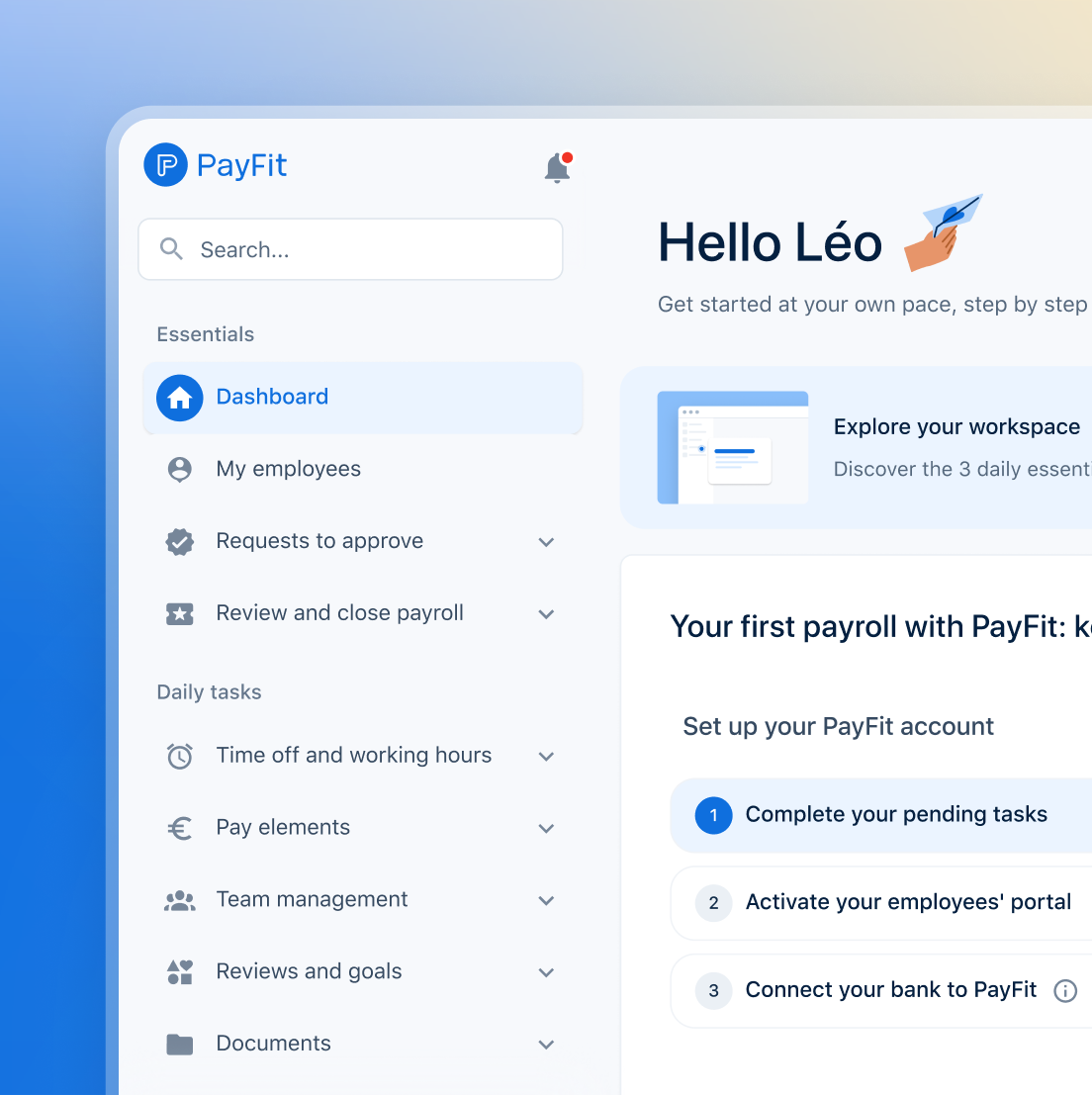✨ Health insurance, now in PayFit - learn more
💷 All the rates & thresholds you need to know for 25/26...right here
✨ The Payroll Journey: Start, Scale & Succeed Globally - learn more
✨ Health insurance, now in PayFit - learn more
💷 All the rates & thresholds you need to know for 25/26...right here
✨ The Payroll Journey: Start, Scale & Succeed Globally - learn more

It’s being billed as the biggest upgrade to workers' rights for a generation.
The Employment Rights Bill 2024 delivered by the new Labour government is a landmark proposal. It packs a lot of promise and ambition to reshape rights for workers in the UK.
With an outlook to improve job quality and employment standards across the board, there are a lot of good measures proposed to support this. Equally, there are still many details to iron out and consultations to be held with professional bodies before many of these measures can become law.
In fact, many of these new measures won’t be enacted very quickly. The bill itself isn’t likely to pass until June or July next year. In addition to this, some consultations are likely to drag on, with changes only likely to be implemented as secondary legislation. For instance, new rights to challenge unfair dismissal won’t become law until Autumn 2026.
As mentioned, the Employment Rights Bill represents the most significant development in employment legislation for decades. As such, it will take time for legal experts and policymakers to comb through all the details involved. Furthermore, the introduction of these new changes into the workplace will require a phased approach. In other words, everything will need to be carefully managed and communicated.
Many measures, such as improvements to flexible working and statutory sick pay and bereavement leave have already garnered support from members of important bodies, like CIPD.
But as with any major piece of legislation, there will be questions to answer, such as whether the new statutory probationary period will replace the unfair dismissal qualifying period.
There’s a lot for companies to digest, especially small businesses that might be running on an HR team of one (or two!). It’s important for People professionals to take time to understand these new changes before they officially become law - something we’re dedicated to helping small businesses do.
From day-one rights to a new probationary period and changes to the way minimum wage is set, there were a number of key announcements impacting businesses in the UK government’s new bill. Let’s run through what the Employment Rights Bill has in store for both employers and employees in the UK.
The scope of day-one rights has been expanded to cover unfair dismissal, paternity and unpaid parental leave, as well as bereavement leave.
This means that from the moment a new hire steps into their role, they’ll benefit from enhanced protection. Once law, workers will be able to qualify for:
Day one Unfair Dismissal Protection: In a major shift, the government is removing the two-year requirement for protection against unfair dismissal - a benefit which will instantly safeguard an additional 9 million workers, making them feel more confident and secure at work.
Extended Parental Leave Rights: In addition to this, unpaid parental and paternity leave will become a day-one right, just like maternity leave already is, providing millions of parents more flexibility. The government has also promised a comprehensive review of all parental leave rights alongside the bill.
Bereavement Leave Policy: Finally, employers will be required to put a bereavement leave policy in place, ensuring a more compassionate approach is taken to bereavement requests and employee welfare.
In another welcome change, statutory sick pay will be available universally from the first day of illness. This will eliminate the previous wait period, which saw sick pay only kick in from the fourth day of illness.
The removal of the lower earnings limit will also ensure workers under the limit stand to benefit from the entitlement, expanding the safety net to catch more employees previously under-supported during health-related absences.
A consultation will be run to explore the introduction of a statutory probation period. This period could potentially extend up to nine months in order to give employers a better chance to assess the suitability of a new hire.
It’s important to note that this change will not infringe upon day one unfair dismissal rights - employees will still be able to claim for this from their first day. However, policymakers will be looking to strike the right balance between offering employers the flexibility they want while still offering employees ample protection.
Payroll audit guide & checklist
For the more than 1 million people on zero-hours contracts, there’s promising news. The proposed changes in the 2024 Employment Rights Bill will allow these workers to request guaranteed working hours after a defined period. This was originally proposed as 12 weeks by Labour, but we’ll have to see what happens during consultation. Employees who want to stay on zero-hour terms will still be able to do so. Nevertheless, this move will provide zero-hour workers with more freedom and flexibility to adjust their work situation to their needs.
Changes to the Low Pay Commission’s scope will allow this body to take into account more data around cost of living when setting the minimum wage. Age bands will also be removed, effectively making the minimum wage rate available to younger staff members. This should ensure a pay rise for hundreds of thousands of younger workers.
A practice that’s long been considered controversial, fire and rehire will be banned, except for in extreme cases. This means employers won’t be able to legally dismiss or ‘sack’ employees from a job, only to rehire them on less favourable terms. This should secure better job stability and conditions for workers over the long run.
The push for flexible working arrangements continues as the new legislation aims to make this the default where practical. This shift is part of a broader strategy to encourage a better work-life balance and to support diversity in the workplace, including specific actions to address gender pay gaps and support women through menopause. Stronger protections will also be put in place to protect women during pregnancy and after returning to work from maternity leave.
A new bill will be published to establish an enforcement body called the Fair Work Agency. This new body will pull together existing enforcement bodies under one umbrella to enforce rights such as holiday pay more keenly. More details should become clear as the bill undergoes further consultation or is enacted.
While a staggering 157 pages long, not everything initially proposed by the new government was covered in the bill. In fact, there are significant gaps when tracking back to Labour’s original ‘new deal for working people’. But the government has promised to follow up with a document outlining plans to implement at least 30 additional proposals. These will include guidance (though no plans for legislation) on the right to switch off and measures to end pay discrimination to close ethnicity and disability pay gaps.
A single-worker status is also still in talks; however, many experts believe this will require a much longer consultation period. As for trade union rights, it’s something the government plans to deliver through other avenues. New rights to online balloting are also anticipated but it looks like no new legislation will be needed to provide these.
At Payfit, we’re passionate about making UK payroll and HR simple for small businesses.
The next few years promise a lot of new changes to the employment law landscape. Having a payroll & HR solution you can trust can help you stay on top of legislation changes. Make payroll compliance one less thing to worry about with fast, automated payroll software that’s backed by real UK payroll experts. Find out more about how PayFit can help you navigate legislation changes with ease.


Learn what the Carer’s Leave Act means in 2026: carers’ rights, how leave works, notice rules, postponement, and policy steps for employers.

Is paternity leave 14 working days in the UK in 2026? Learn how long paternity leave lasts, who is eligible, how pay works and what notice is required.

Learn what Labour’s 4-day week plans mean in 2026, plus your options now: flexible working, compressed hours, contracts, and HR actions.

What is the Alabaster ruling? Learn how pay rises during maternity leave affect Statutory Maternity Pay (SMP) and how to calculate arrears correctly.

A guide for employers on the Neonatal Care Act, in force since April 2025. Learn about leave entitlement, pay eligibility, notice periods & the two-tier system.

A new flexible working law came into effect in 2024. Employees have more say over how & when they work. Understand what it means for you as an employer.

See what's new in PayFit
New features to save you time and give you back control. Watch now to see what's possible